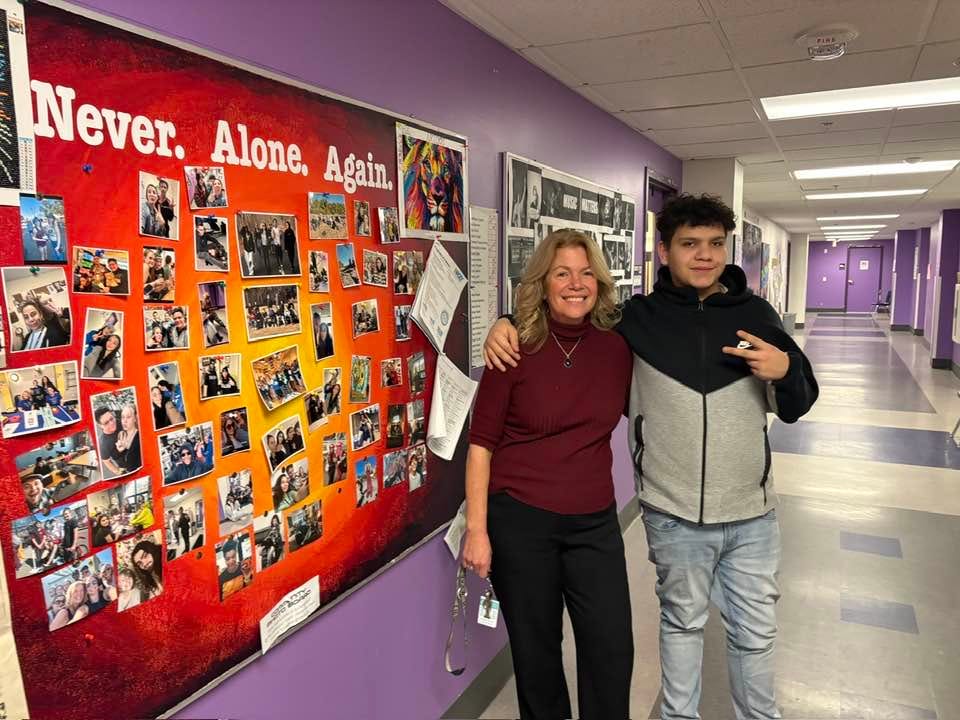Future of school in doubt
For two decades, Beverly-based Northshore Recovery High School has helped students battling addiction. Now it could be facing closure.
When you think of schools in Beverly, you think of the high school, the middle school, the elementary schools, private schools. But the school with the most compelling mission of all of them is one you probably rarely think about, or might not even know exists.
And right now, the future of that school is in doubt.
Northshore Recovery High School, the first-of-its-kind school for students with addiction and mental health challenges, is facing the possibility of closure. Officials say enrollment is down to 25 students this year and the school is running a deficit.
Asked by The Beverly Beat if there’s a chance the school could close, Northshore Education Consortium Executive Director Fran Rosenberg said, “I think there’s a chance.”
“It’s not what I’m recommending to my board for this year,” Rosenberg said. “If we look at the next several years, I think there’s a chance.”

Northshore Recovery High School is run by the Northshore Education Consortium, a collaboration of 20 school districts in the area that operates a variety of special education programs. The Recovery School opened in 2006 as the first of its kind in Massachusetts (there are now five). Located on Sohier Road, it serves students from ages 14 to 21 with substance use and mental health challenges.
I’ve covered the school for years and it’s a special place. Its graduation ceremonies are tear-jerkers, with each graduate stepping up on stage to tell their personal story of trying to overcome addiction. Almost all of them say the same thing — I couldn’t have done it without Recovery School.
Not every story is a success. Several students over the years have died from drug overdoses. But the staff at the school, some who have worked there since it opened, persist.
The major problem facing the school now is declining enrollment. Recovery School has averaged about 35 students a year since 2020, and was as high as 55 at one point. The students’ home districts pay the tuition, which ranges from $17,000 to $21,000. With the drop to 25 students this year, there’s obviously less money to fund the school, which has 11 full-time-equivalent employees. (Northshore Recovery also gets funding from the state, but that amount has not increased since 2006.)
Rosenberg said she’s not sure why enrollment is down. It could be because districts are doing more in their own schools to help students with these problems, reducing the need to send them to a separate school like Recovery School.
“Although Recovery High School has been a tremendously wonderful resource for the community for the past 18 years and has saved lives and has changed the way people on the North Shore look at addiction recovery, maybe we need to make a change,” Rosenberg said.
“It’s a very emotional conversation because it’s been such a beloved model for all of us for so long,” Rosenberg said. “But I have to ask those questions.”
Principal Michelle Lipinski, who founded the school, said she feels “blind-sided” by talk of potentially closing it.
“We need a conversation that includes everyone,” she said. “People need to come out and talk about how people can access these services.”
Lipinski said there’s still a need for Northshore Recovery High School. The country is still facing an opioid epidemic, and more students are struggling with alcohol and marijuana use, as well as mental health challenges related to trauma and bullying, she said.
Lipinski said her staff, some of whom have been with her from the beginning, have worked tirelessly to make Northshore Recovery into an important resource for students and families. She said she blames herself in part for not promoting the school more.
“In the midst of an opioid epidemic we need to get the word out in a larger way,” she said.
The Northshore Education Consortium’s board of directors, which is made up of either a superintendent or School Committee member from each its 20 member school districts, is scheduled to discuss the future of Recovery School at its next meeting on March 5 at 8 a.m. The meeting will be held at the consortium’s building at 112 Sohier Road and is open to the public.
Rosenberg said parking is limited and for security reasons asked that anyone who plans to attend the meeting notify her in advance at frosenberg@nsedu.org.
The Beverly Beat says thanks
What can I say but ‘thank you’ after all the support you showed yesterday on the first official day of The Beverly Beat. The response has been very encouraging, and it’s so gratifying to know that people are willing to support and even pay for local journalism. I’m very motivated to live up to your expectations.
One reader had a good question: Do you get anything extra for becoming a founder member rather than a monthly or yearly subscriber? The honest answer is not really. Becoming a founder member is just another way to support this project and help keep it sustainable. To those who have already done that, I can’t express my appreciation enough.




Great story Paul.
Great story!! I love Leighton’s style. Keep up the great work! And thank you for getting word beyond Beverly (I didn’t say it!) about this concept because other districts should know this school and model exists.